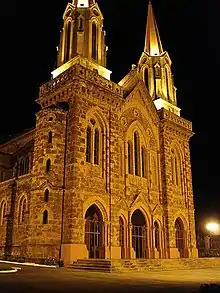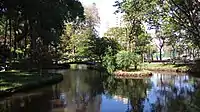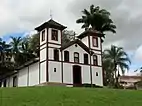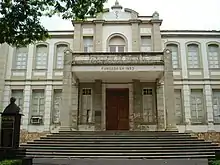Uberaba
Uberaba (Portuguese pronunciation: [ubeˈɾabɐ]) is a city in the state of Minas Gerais, southeast Brazil. It is located in the Brazilian Highlands at an elevation of 823 metres (2,700 ft) above sea level on the Uberaba River, and is situated 418 kilometres (260 mi) from the state capital, Belo Horizonte.[3] The city was granted its status in 1856 and derives its name from the Tupi language, meaning 'bright water'.[4] As of 2021, the population was 340,277 inhabitants.
Uberaba | |
|---|---|
| Municipality of Uberaba | |
 Flag  Coat of arms | |
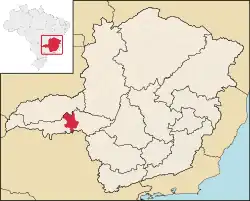 Location in Minas Gerais | |
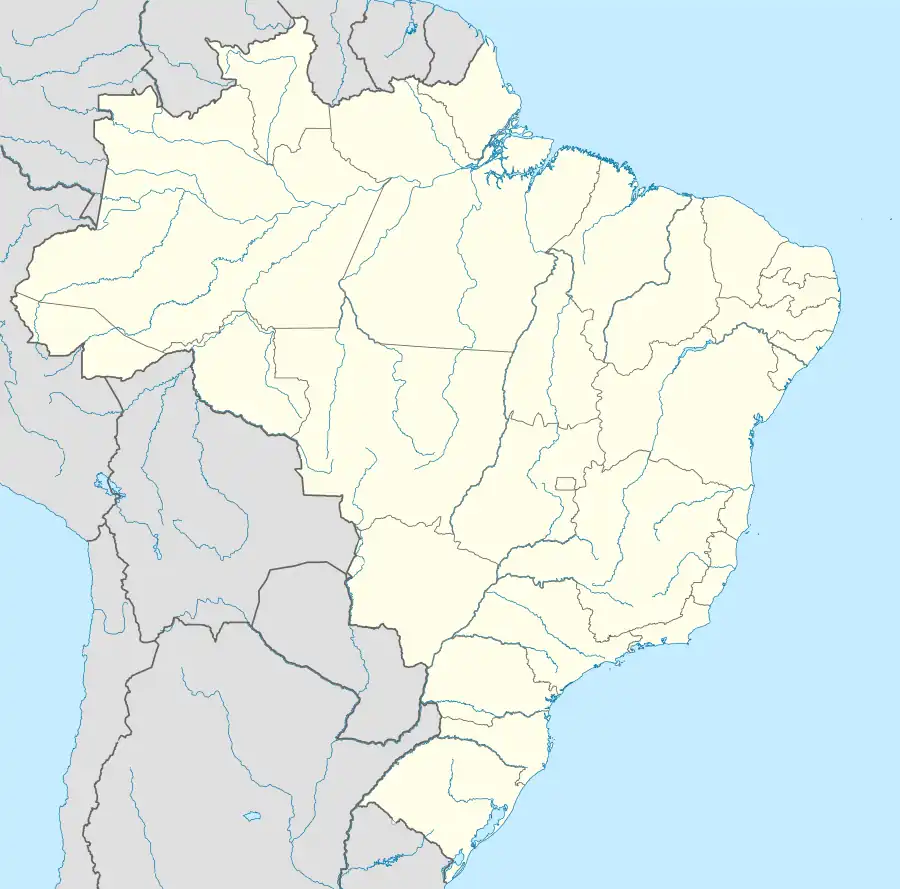 Uberaba Localization of Uberaba in Brazil | |
| Coordinates: 19°44′52″S 47°55′55″W | |
| Country | |
| Region | Southeast |
| State | |
| Founded | 2 March 1820 |
| Government | |
| • Mayor | Elisa Gonçalves de Araujo (2021) (SD) |
| Area | |
| • Total | 4,529.7 km2 (1,748.9 sq mi) |
| Elevation | 823 m (2,700 ft) |
| Population (2021)[1] | |
| • Total | 340,277 |
| • Density | 71/km2 (180/sq mi) |
| Time zone | UTC−3 (BRT) |
| • Summer (DST) | UTC−2 (BRST) |
| Postal Code | 38000-000 |
| Area code | +55 34 |
| HDI (2010) | 0.772 – high[2] |
| Website | www |
History
The history of Uberaba traces its origins back to 1810, when Captain Major Eustaquio founded a settlement near the ancient Anhanguera route, commonly known as the "Goyazes road," to serve as a resting point for both locals and travelers during the 19th century. Its strategic location and function as a crossroads prompted local farmers to engage in crop cultivation and cattle domestication for commercial purposes, leading to the establishment of a robust livestock network in the region.[5]
Initially a part of the Captaincy of Goias, the territory of Uberaba was incorporated into the Captaincy of Minas Gerais in 1816. It gained recognition as a parish in 1820 and was officially designated as a city in 1856.[6]
The establishment of the inaugural railway station in 1889 marked a notable milestone in the history of Uberaba. This achievement was a result of the expansion of the Mogiana Railway from the neighboring municipality of Sacramento. The introduction of the railway system played a crucial role in fostering the growth of the local economy in the following years.[7]
Currently, Uberaba is well-known for its lively livestock and agribusiness events. As an industrial hub, the city functions as a regional center for culture, commerce, and entertainment, hosting a diverse array of institutions, markets, and entertainment venues.[8]
The municipality also encompasses the district of Peirópolis, a paleontological site located in the rural area of Uberaba. Within this district, one can find the Paleontological Research Center Llewellyn Ivor Price (Centro de Pesquisas Paleontológicas Llewellyn Ivor Price), established as a tribute to Llewellyn Price, who worked extensively in the local area, and a museum dedicated to the fossils discovered in the vicinity.[9]
Geography
Climate
Uberaba has a Tropical climate (Aw) with an average annual temperature of 21.9 °C (71.4 °F). The highest temperature ever recorded was 40.2 °C (105.2 °F) in October, while the lowest recorded temperature was −2.2 °C (28.0 °F) in July.
Precipitation occurs on an average of 86 days per year, with the highest amount in December and the lowest in July.[10]
Demographics
Uberaba is the primary municipality in the Intermediate Geographic Region of Uberaba.[11]
In 2021, the Immediate Geographic Region of Uberaba comprised 10 municipalities spanning an area of 14,281.652 km² (5,514.17 sq mi).
The municipalities within the region include:
Economy
Uberaba is a significant producer of grains in the state, particularly corn, soybean, coffee, cotton, and sugarcane. The city is also renowned for hosting Expozebu, one of the world's largest cattle fairs held annually in May.[12][13]
The service sector employs slightly over half of the city's population, followed by the manufacturing industry, and agriculture ranking third. The industrial sector encompasses various fields such as agribusiness, food processing, textile manufacturing, steel production, mining, chemical manufacturing, electronic devices, home appliances, and more.[14]
Within the industrial park, there are processing plants operated by major chemical companies, including Mosaic (formerly Vale S.A.), FMC Corporation, Sipcam Nichino (UPL), and Yara.[15]
Cargo transportation to other cities is primarily done via road and rail networks.[16]
Crop Plantations (2006)
- Bananas: 28 hectares
- Coffee: 1,000 hectares
- Oranges: 1,410 hectares
- Tangerines: 168 hectares
- Cotton: 3,145 hectares
- Rice: 543 hectares
- Peanuts: 100 hectares
- Potatoes: 2,190 hectares
- Sugarcane: 36,000 hectares
- Onions: 450 hectares
- Beans: 1,450 hectares
- Cassava: 1,300 hectares
- Corn: 50,000 hectares
- Soybeans: 100,000 hectares
- Sorghum: 1,250 hectares
- Tomatoes: 240 hectares
- Wheat: 336 hectares
Farming Statistics (2006)
- Number of farms: 1,093
- Agricultural area: 282,692 ha.
- Planted area: 105,000 ha.
- Area of natural pasture: 112,678
- Workers directly employed by producers: 1,764
- Workers indirectly employed in the sector: 2,533
Paleontology
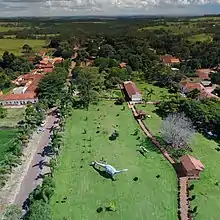
Uberaba is recognized for housing a significant paleontological site in Brazil, boasting fossil records dating back approximately 80 to 66 million years, from the Late Cretaceous period.
The first paleontological discoveries in Uberaba were made by chance in 1945 when workers on a rural construction site accidentally came across well-preserved fossils. Subsequently, paleontologist Llewellyn Ivor Price, associated with the National Department of Mineral Production (DNPM), conducted extensive scientific research in the region until 1974. The specimens collected during this period were later transferred to the Museum of Earth Sciences in Rio de Janeiro.
In 1991, the Municipality of Uberaba established the Paleontological Research Center Llewellyn Ivor Price, and Dinosaur Museum in the district of Peirópolis, located approximately 25 km from the city center. This research center has emerged as a significant hub for paleontology in the country, housing laboratories, accommodations for researchers, and a technical reserve dedicated to preserving fossils.
The Research Center collaborates with various research institutions, both within Brazil and internationally, contributing to advancements in understanding the fossil fauna and environments of the Late Cretaceous in Uberaba.
In 2004, a significant finding occurred in the region of the Serra da Galga Formation, spanning across Uberaba municipality. Numerous fossils of the sauropod dinosaur Uberabatitan were discovered, making it one of the largest animals to have inhabited Brazil since the formation of the Earth.[17]
As an integral part of the Research Center, the Dinosaur Museum plays a crucial role in disseminating paleontological knowledge to the general public through interactive and educational exhibitions, attracting an average of 100,000 visitors annually from various locations.[18]
Transportation
Uberaba is served by Mário de Almeida Franco Airport.
Notable people
- Alfredo Moser, inventor.
- João Menezes, tennis player.
- Yuu Kamiya, artist.
Popular culture
Uberaba is renowned for being the residence of the philanthropist and spiritualist medium Chico Xavier. Xavier was born in Pedro Leopoldo in 1910 and resided in Uberaba from 1959 until his passing at the age of 92 on June 30, 2002. He was laid to rest in the city.[19]
References
- IBGE 2020
- "Archived copy" (PDF). United Nations Development Programme (UNDP). Archived from the original (PDF) on 8 July 2014. Retrieved 1 August 2013.
{{cite web}}: CS1 maint: archived copy as title (link) - "Uberaba | Brazil | Britannica". www.britannica.com. Retrieved 7 March 2022.
- giftnily.com (7 March 2022). "There is tupi in Portuguese spoken in Brazil". Giftnily. Retrieved 7 March 2022.
- "Urban land: the relationship between religious and public institutions in the control over the land heritage for founding the city of Buritizal / SP" (PDF).
- "IFTM | Congresso de Internacionalização e Educação Profissional e Tecnológica". www.iftm.edu.br (in Brazilian Portuguese). Retrieved 29 June 2022.
- "THE TRAMWAYS OF SACRAMENTO". tramz.com. Retrieved 17 March 2022.
- Santana, M. L.; Pereira, R. J.; Bignardi, A. B.; Filho, A. E. Vercesi; Menéndez-Buxadera, A.; El Faro, L. (1 December 2015). "Detrimental effect of selection for milk yield on genetic tolerance to heat stress in purebred Zebu cattle: Genetic parameters and trends". Journal of Dairy Science. 98 (12): 9035–9043. doi:10.3168/jds.2015-9817. ISSN 0022-0302. PMID 26476953.
- "Paleophilatelie.eu – Brazil 1995". www.paleophilatelie.eu. Retrieved 7 March 2022.
- "Uberaba Climate, Weather By Month, Average Temperature (Brazil) – Weather Spark". weatherspark.com. Retrieved 7 March 2022.
- "Divisões Regionais do Brasil | IBGE". www.ibge.gov.br. Retrieved 29 June 2022.
- Iglesias, Carlos; Sesmero, Juan P. (1 June 2015). "Economic Analysis of Supplementing Sugarcane with Corn for Ethanol Production in Brazil: A Case Study in Uberaba". BioEnergy Research. 8 (2): 627–643. doi:10.1007/s12155-014-9551-4. ISSN 1939-1242. S2CID 15362034.
- Intelligence, fDi. "From zebu to tattoos, Uberaba's pioneering spirit lives on". www.fdiintelligence.com. Retrieved 7 March 2022.
- Intelligence, fDi. "Uberaba thinks beyond the crop". www.fdiintelligence.com. Retrieved 7 March 2022.
- "Acid Plant Database October 21, 2019". Agência de Notícias Brasil-Árabe. 24 July 2019. Retrieved 7 March 2022.
- "Export Processing Zone launched in Uberaba". Agência de Notícias Brasil-Árabe. 27 April 2018. Retrieved 7 March 2022.
- "Fossilworks: Uberabatitan". www.fossilworks.org. Retrieved 24 July 2023.
- "Sesc São Paulo - Em Minas, um ninho de dinossauros - Revistas - Online". 25 July 2023. Archived from the original on 25 July 2023. Retrieved 25 July 2023.
- "Obituary: Chico Xavier". the Guardian. 11 July 2002. Retrieved 17 March 2022.


